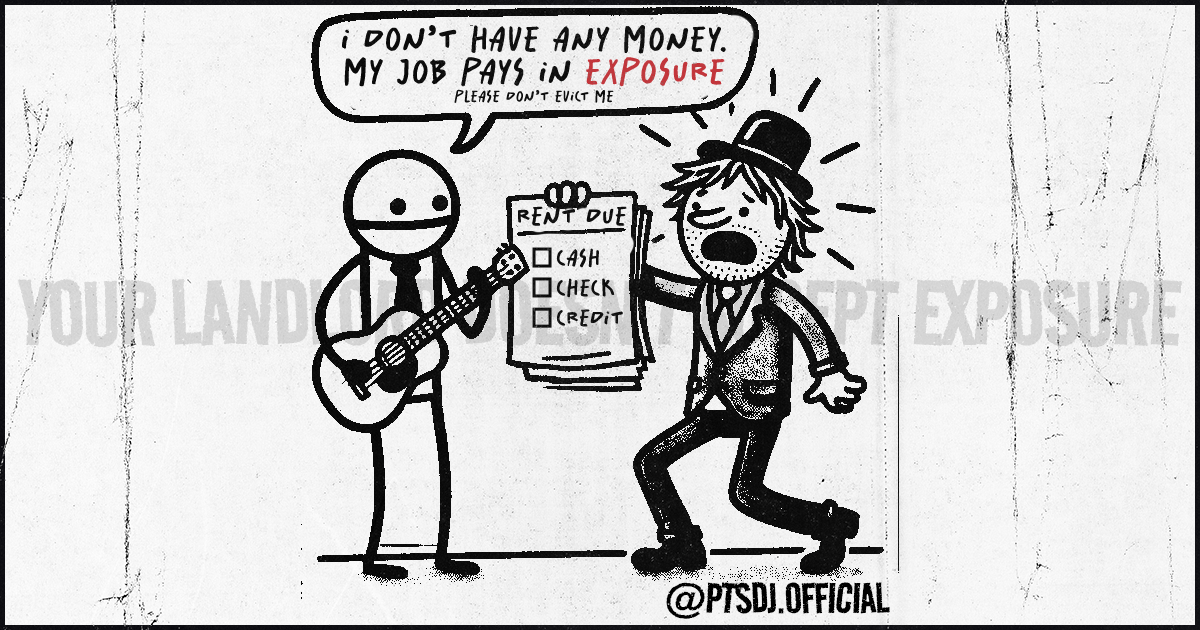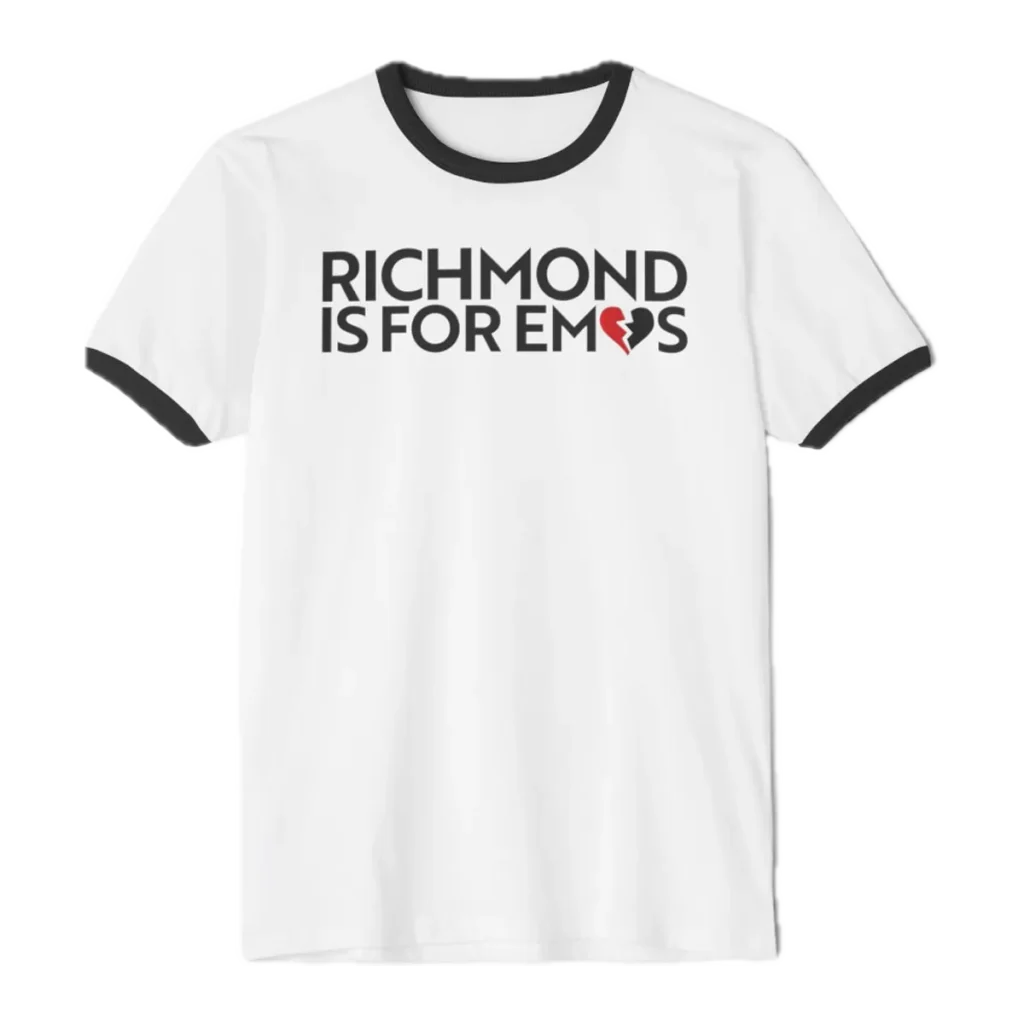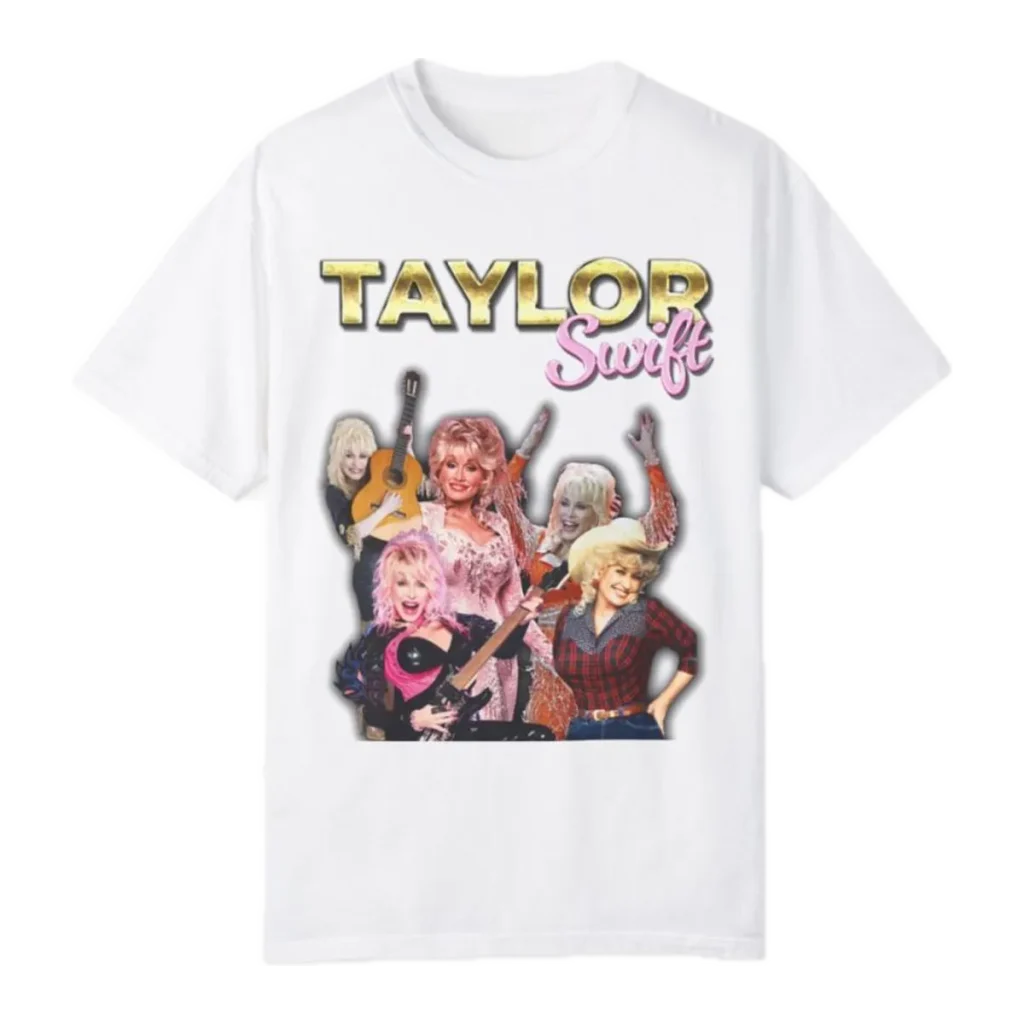Author’s Note: this article does not account for things like benefit shows, favors for family or friends, and other edge cases.
For bands and DJs breaking into the world of live performances, finding somewhere to play can be pretty difficult. COVID has had a devastating effect on small venues across the country and there are fewer and fewer places available for younger bands to play.
Many opportunistic bar & venue owners, smaller promoters, and even some mid-sized bands are taking advantage of the limited show spaces, offering bands and DJs a slot on a show in exchange for “exposure” – a practice that giant venues and promoters have been at for decades – and one that bands are often tempted into accepting. The hope is that playing for free (or at a loss) today will lead to paid gigs in the future.
The reality is that the “exposure” usually doesn’t materialize, venue owners and promoters are taking advantage of performers desire to get on stage, and most importantly, “exposure” will never pay the bills. Musicians should be fairly compensated for their time, effort, and talent.
Your landlord doesn’t accept exposure. Neither should you.
The False Promise of Exposure
In the live music scene, the allure of exposure can be particularly enticing. Young bands and aspiring musicians often find themselves offered gigs at venues or events with the promise of playing in front of a large audience, but without any monetary compensation. The pitch is seductive: perform for free now, and the exposure could lead to paid opportunities down the line. However, this promise rarely materializes into a sustainable career path. While playing to a packed house might feel like a step towards stardom, the reality is that most audience members won’t retain the band’s name or seek out their music afterwards, let alone book them for paid performances.
For someone driven to perform, the idea of exposure can be particularly enticing. Young bands and DJs will often find themselves offered gigs at bigger venues, festivals, or opening slots with bigger bands in exchange for the privilege of playing in front of a large audience – without any monetary compensation (or worse – “pay-to-play*”). It makes sense in theory: perform for free now, blow up, get paid opportunities in the future.
* – “pay-to-play” is a similar practice – but instead of simply performing for free, the artist is asked to sell (usually a minimum number of) tickets to the concert – often more tickets than the headlining artist. This is something I’ll cover in a future post.
The trend of performing in exchange for exposure has become increasingly common at all levels of the music industry, especially as small venues face their own financial struggles. This creates a problematic cycle where artists are expected to invest time, talent, resources – without any guarantee of return (and more often than not, a net loss). This practice doesn’t just devalue the skills and efforts of artists – but it gives (yet another) disadvantage to artists who don’t have the financial means to sustain a band through unpaid gigs.
While there are rare instances of a free performance leading to a “big break” for a musician, these success stories are the exception, not the rule. For the vast majority of musicians, the path to a viable career in live music requires a combination of hard work, luck, and resources to unlock larger opportunities. This requires fair compensation for live performances, allowing musicians to invest in their art and work to build a sustainable career in the industry.
The Financial Burden of Being a Musician
Being a musician involves far more than raw talent and passion; it demands a substantial financial commitment that often goes unrecognized by those dangling the carrot of “exposure” as compensation. The costs associated with pursuing a music career can be staggering. High-quality instruments, essential audio equipment, ongoing maintenance, and upgrades form just the baseline of expenses. Add to this the price of music lessons, theory classes, and workshops needed to refine one’s skills, along with the recurring costs of rehearsal space rentals, and the financial burden becomes evident. These investments are not optional extras, but fundamental necessities for any serious musician looking to perform at a professional level.
Being a musician involves far more than raw talent and passion; it demands significant financial commitments and sacrifices that often go unnoticed by venue owners, promoters, and even music fans. The costs of pursuing a career in music can be on par with starting a food truck, opening a storefront, or college tuition. Instruments, audio equipment, maintenance, and upgrades are just the bare minimum. Transportation costs, practice space, staying fed and sheltered on the road, and costs of self promotion are constantly increasing.
The time commitment required to become a musician can be equally daunting and often ignored. Countless hours are put into individual practices, band rehearsals, songwriting sessions, and performances. Artists are responsible for self-promoting their music, upcoming gigs, growing a social media presence, and constantly planning the “next step.” Many musicians juggle this schedule alongside a day job or something close to full-time gig work.
When venue owners or promoters ask artists to perform in exchange for exposure, they’re not just asking musicians to play for free; they’re asking them to disregard the financial and time commitments and provide a professional service for free. It’s a model that undermines the cost and value of musicianship and threatens the sustainability of live music for all but the largest acts.
Musicians Are Professionals
There’s nothing more exciting than a packed room full of people singing along and watching every move you make. If Pfizer could bottle that shit up and sell it, depression would cease to exist in six months. The unfortunate reality is that feelings don’t pay bills and musicians are human beings with real needs and financial responsibilities. The idea of the “starving artist” is harmful and needs to be left burning in history’s dumpster fire. Like any professional, musicians have rent to pay, families to support, and aspirations that extend beyond simply performing.
By perpetuating the idea that musicians should work for free or “for exposure,” venue owners and promoters are declaring that their art, skills, and time have no monetary value. They’re simply vessels to sell overpriced drinks or make sure a promoter can pay a touring band’s guarantee. This pervasive mindset is not only harmful to individual artists, but poses a threat to the entire live music ecosystem. By devaluing music, venues risk driving talented artists away from their passion, simply because they cannot afford to be a musician.
The challenges faced by musicians in receiving fair compensation have been further exacerbated by recent technological developments. The rise of AI-generated music, while innovative, has flooded the market with cheap, royalty-free alternatives that undercut human artists. Simultaneously, the shift to streaming platforms has dramatically altered the revenue landscape for musicians. With streaming services offering minuscule payouts per play, artists often find themselves struggling to earn a living wage even when their music reaches millions of listeners. This combination of AI competition and paltry streaming revenues compounds the existing issue of music devaluation, creating an environment where it’s increasingly difficult for musicians to justify their craft financially. As a society, we must recognize the value of human creativity and ensure that our appreciation for music translates into fair compensation for those who create it.
These challenges are only exacerbated by technological advancements. The rise of AI-generated music has flooded the market with cheap, royalty-free “songs” that undercut human artists (especially ambient music artists).
Author’s Note: I personally believe that there’s a place for AI. I’m not entirely sure what that use is. Right now I use it to make stupid meme songs that I’d never pay a real life band to record (and thus, probably shouldn’t exist).
The shift to extremely low-paying streaming services threaten to further devalue music and undercut human artists. Artists with millions of Spotify streams can often find themselves struggling to earn even poverty wages.
This combination of AI competition (both financial and for listener’s attention) and paltry streaming revenues compounds the existing issue of music being devalued. This is creating an environment where it’s increasingly difficult for musicians to justify their craft financially. As a society, we need to recognize the value of human creativity and ensure that our appreciation for music translates into fair compensation for those who pour their hearts into creating it.
Getting that Bag as a Musician
Fair compensation for musicians is not just an ideal; it’s a necessity for the sustainability of the live music industry. While traditional union models may not resonate with all segments of the music community, there are several viable approaches to ensure musicians are paid fairly for their performances. These models not only provide financial stability for artists but also align the interests of musicians with those of venues and event organizers.
Musicians being paid fairly isn’t just an ideal; it’s a necessity for the long-term sustainability of the live music industry – especially at the local levels. While asking for pay can be a little uncomfortable, there are several approaches musicians can take to ensure they’re being paid fairly for live performances. The following models can help build financial stability and also incentivize artists, promoters, and bands collaborating on more successful events.
Guaranteed Rates
The guaranteed flat rate is perhaps the most straightforward approach. This model involves agreeing on a set fee for the performance, regardless of ticket sales or bar revenue. It provides musicians with a predictable income and allows them to budget accordingly. For venues, it simplifies financial planning and can help build trust with performers. However, the challenge lies in determining a fair rate that reflects the artist’s draw and the venue’s capacity to pay. A tiered system based on factors like the day of the week, expected attendance, or the artist’s experience could help standardize this approach.
Asking for a guarantee is the most straightforward – and often most uncomfortable approach. This model is exactly what it sounds like: the artist and venue (owner or promoter) agree on a set fee for the performance, regardless of paid attendance, ticket sales, bar revenue, etc. This provides musicians with a predictable income and allows them to budget accordingly. For venues, it simplifies financial planning, helps build trust with the music community, and offers significant upside with bar sales. Determining a fair rate can be challenging and should reflect an artist’s ability to attract a crowd as well as a venue’s capacity to pay.
Many venue owners and promoters will balk at the idea of a guarantee for an artist that isn’t signed, so this approach is most likely to work when you’ve shown a track record of attracting a crowd that will make the venue money.
In the event of guaranteed pay, it’s always best to have a contract to protect yourself (and the venue).
Door Deals
The door deal, where musicians receive a percentage of ticket sales, directly ties compensation to audience turnout. This model can be particularly beneficial for artists with a strong following, as it allows them to directly benefit from their ability to draw a crowd. It also incentivizes musicians to promote their shows actively. However, it does place more risk on the artist, as a poorly attended show could result in minimal compensation. To mitigate this, many venues offer a guaranteed minimum payment in addition to the door percentage, providing a safety net for performers.
A door deal is probably the most common method of compensating artists. This type of deal gives artists a percentage of the ticket sales – which directly ties compensation to audience turnout. This model can be particularly beneficial for bands with a strong following, as they will directly benefit from their ability to draw a crowd. This also incentives musicians to promote these concerts actively.
Door deals do place more risk on the artist, as a poorly attended show could result in taking a loss on a show. To mitigate this, many artists will negotiate combination of a guaranteed rate and a door deal.
Bar Sales
An approach that many small and mid-sized artists appreciate is when a venue offers artists a percentage of alcohol sales. This model recognizes that live music is often (in the eyes of venue owners) a vehicle to sell high margin drinks. By giving musicians a stake in these profits, venues acknowledge the value that performers bring beyond ticket sales. This approach can work particularly well in smaller bars and venues where the performer exists as “background music” to create an atmosphere. It encourages a symbiotic relationship where both the venue and the musician have incentive to promote a successful event.
Each of these models has its merits, and the best choice is often dependent on the specific circumstances of the venue, performer, and often the show itself. What’s crucial is moving away from the expectation of performing for free and recognizing that fair compensation benefits a healthy live music ecosystem. By adopting these models, a combination of them, or developing similar models, we can ensure that artists are valued for their contributions and sustain their careers, and venues can remain profitable.
Knowing Your Worth
Knowing and asserting your value as a performer is crucial in getting paid fairly for your gigs. This requires an honest self-inventory of what you (or your band) bring to the table. Consider your years of training, practice, and experience honing your craft. Think about the unique qualities that set your performances apart. If you have a following, even a small one, recognize that you’re not just offering to fill time with music – you’re bringing customers to the venue. Your social media reach, ability to engage an audience, and professional reliability are all parts of your value proposition.
When negotiating with venue owners or promoters, approach the conversation with confidence and professionalism. Be prepared to ask for a firm figure – and be prepared to explain why you’re worth that much. This could involve discussing you draw, equipment, resonance with existing clientele, and any other value you provide, such as promotion or production elements.
Don’t be afraid to discuss specifics. Whether it’s a flat rate, door deal, or percentage of bar sales, have a minimum amount that you’re willing to accept – and be prepared to walk away from gigs that don’t meet your standards.
It can be tempting to take any gig offered (and there are absolutely legitimate cases of “I can’t say no to that”), accepting undervalued work doesn’t just hurt your bottom line. It contributes to the devaluation of live music as a whole. No gig undermines your worth. By constantly striving for fair compensation, you’re creating a sustainable ecosystem for all performers.
The Role of Venues and Event Organizers
Venues and promoters aren’t just gears in the industry machine; they’re essential partners in cultivating an ecosystem of live performances. When these entities recognize and treat musicians as valued collaborators rather than “that band in the corner,” they lay the groundwork for a thriving, sustainable music scene that benefits all parties involved. The shift in perspective from short-term cash grab to long-term relationship building creates a healthy live music landscape.
A cornerstone of this partnership approach is the use of clear, fair contracts for all shows, regardless of the size or perceived importance of the gig. These agreements should comprehensively outline expectations, responsibilities, and compensation for venues, bands, promoters, and other involved parties.
For musicians, this means having in writing agreed-upon payment terms, whether it’s a flat rate, percentage of door or bar sales, or a combination. It should also cover specifics like set length, equipment provisions, hospitality, and any additional expectations like promotion or merchandise sales.
For venues, a contract ensures they can rely on a professional performance and clarifies their obligations. Don’t hesitate to request or provide a contract, even for smaller shows or seemingly informal arrangements. This practice not only protects all parties but also sets a professional tone for the engagement.
By normalizing the use of contracts, we create a more transparent, respectful, and ultimately more successful environment for live music. Remember, a handshake deal might seem friendly, but a written agreement is a mark of mutual respect and professionalism that benefits the entire industry.
Changing the Culture
Transforming the pervasive “exposure” culture in the music industry demands a concerted effort of education and advocacy. This shift requires engagement from all stakeholders: musicians, venues, event organizers, and audiences alike. It’s crucial to foster a widespread understanding of the true value of live music and the substantial costs – both financial and personal – associated with its creation and performance.
Eradicating “exposure” culture in the music industry can help foster a much healthier music scene that offers fair compensation to everyone involved in producing a live show.
For musicians, this means not only advocating for themselves while negotiating gigs, but also supporting their peers. Join groups for local musicians on social media where you can share experiences, discuss fair rates, and discuss ways to improve the industry for everyone. Engage in open and honest conversations with your audience – many fans don’t realize that their favorite DJ is probably driving Uber 6 days a week.
For venues and promoters, it involves recognizing that fairly compensated musicians are more likely to deliver high-quality performances, attract larger audiences (who drink!), and contribute to a vibrant local music scene.
Fans can show their support by supporting venues that treat musicians fairly, helping to share concerts with their followers on social media, and stopping by the merchandise booth and buying a t-shirt or record.
By collectively raising awareness and setting expectations, we can shift the paradigm from one of exploitation to one of mutual respect and fair compensation. Remember that every time you stand firm on your worth or educate others about the value of live music, you’re contributing to an ecosystem that benefits us all. Changes in the industry might not happen overnight… but we saw how fast things have changed since COVID-19. We can create a more equitable future for performers. Let’s get out there and do it.
FAQs:
Q: Isn’t playing for exposure a good way for new musicians to get started?
A: While it might seem like a good strategy, relying on unpaid gigs for exposure often leads to a cycle of undervaluation. Instead, new musicians should focus on building their skills, creating a strong online presence, and seeking out fair-paying opportunities, even if they’re small at first.
Q: How can I convince a venue to pay me when they’re used to offering only exposure?
A: Start by clearly articulating your value. Explain your experience, the audience you can bring, and how your performance will benefit their business. Be prepared to negotiate and have a clear minimum rate in mind.
Q: What if I’m just starting and don’t have much experience? Should I accept unpaid gigs then?
A: Even as a beginner, your time and talent have value. Instead of unpaid gigs, look for open mics, jam sessions, or collaborate with other new musicians. These can provide experience and exposure without setting a precedent of working for free.
Q: How can I support fair pay for musicians as a music fan?
A: Support venues and events that pay musicians fairly. Be willing to pay cover charges or buy tickets to shows. Purchase merchandise directly from artists when possible. And spread the word about great performances you’ve seen – word-of-mouth promotion is valuable and free!
Q: Isn’t it better to play for free than not play at all?
A: While it might seem that way, consistently playing for free can harm your career in the long run. It sets a precedent that your work isn’t valuable and can make it harder to negotiate fair pay in the future. It’s often better to focus on creating your own opportunities or collaborating with other musicians than to accept exploitative conditions.





4 Responses
FORUMS RAPING LITTLE MENSTRUATION CHILD SEX-DOLL फोरम Девчонки 935 gb записи yandex облако.
ARCHIVE FOLDERS PAID 720-1080 Premium HD Videos and HQ Photos OPEN IN ANONYMOUS TOR BROWSER WEBSITE
LINK: http://datx5es2l2qs4f3asz45ic3untbj36tjzthn7oh444fi3mzd4kryxhad.onion
risur9
kexol2
j5a10e